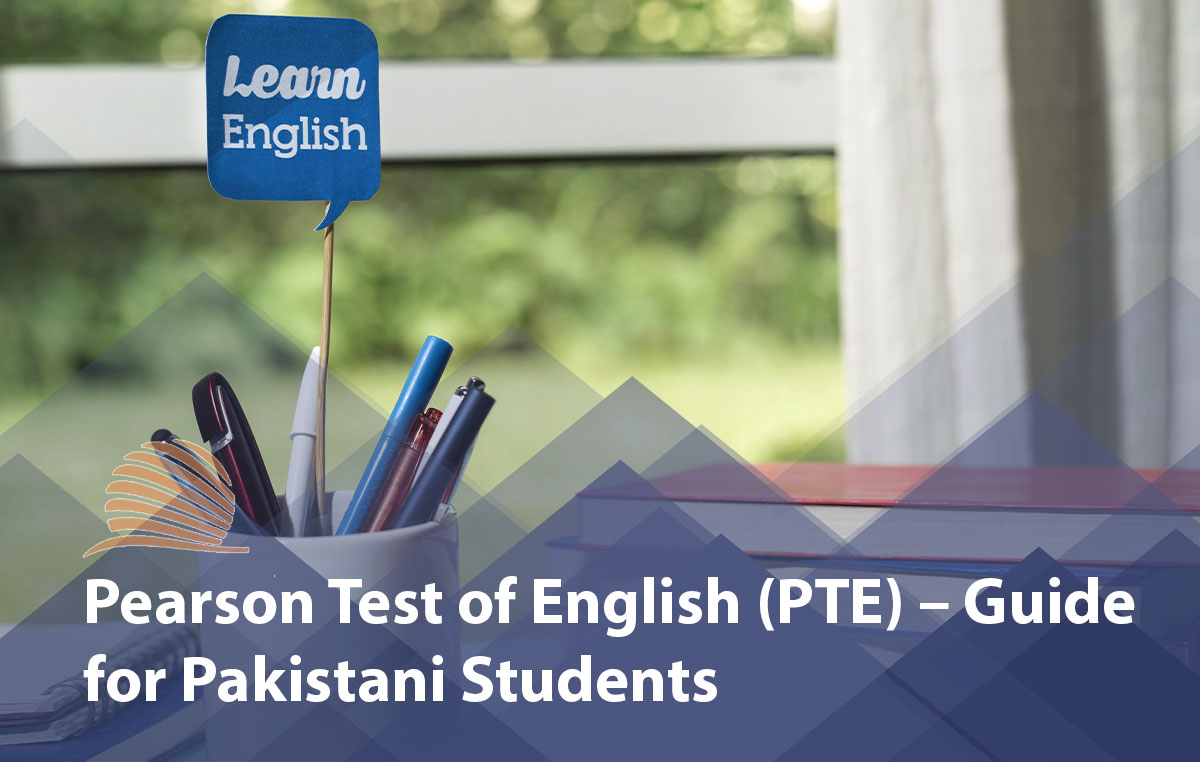Pearson Test of English (PTE)

Study abroad expert advice
Don't waste time! just fill the form to get help.
Pearson Test of English (PTE)
The Pearson Test of English (PTE) has become one of the most preferred English language proficiency tests for students and professionals in Pakistan aiming to study, work, or migrate abroad. Known for its computer-based format, AI-driven scoring, and quick results, PTE offers a modern, fair, and reliable alternative to traditional English tests like IELTS and TOEFL.
Accepted by thousands of universities, colleges, and government agencies worldwide, PTE provides Pakistani candidates with a straightforward pathway to achieving their academic and career ambitions.
What is the PTE Test?
The Pearson Test of English is an internationally recognized English proficiency exam designed to evaluate your skills in speaking, writing, reading, and listening. Unlike some traditional exams, PTE is fully computer-delivered, and even the speaking test is recorded and scored by artificial intelligence.
This eliminates human bias, making it an attractive choice for many Pakistani test-takers. PTE is especially popular among those applying for higher education in Australia, the UK, USA, Canada, and New Zealand, and is also accepted for certain immigration and professional licensing purposes.
Why PTE is Popular in Pakistan
Over the last few years, PTE has gained tremendous popularity in Pakistan because it offers:
- Faster Results – Results are typically available within 48 hours.
- Flexible Scheduling – Tests are conducted on multiple days each month, allowing candidates to book convenient slots.
- Fair Assessment – AI-based scoring ensures accuracy and impartiality.
- Global Acceptance – Recognized by thousands of institutions and immigration departments.
- Fully Computer-Based – Ideal for candidates comfortable with technology.
- No Face-to-Face Speaking Test – Reduces anxiety for shy or nervous speakers.
Types of PTE Tests
Although Pearson offers multiple PTE versions, PTE Academic is the most common for Pakistani students applying to universities abroad.
PTE Academic
- Purpose: Higher education and skilled migration.
- Duration: About 2 hours.
- Structure: Three sections — Speaking & Writing, Reading, and Listening.
PTE Academic UKVI
- Specifically for UK visa and immigration applications.
- Same test format as PTE Academic but includes extra security measures.
Benefits of PTE for Pakistani Students
Choosing the PTE test in Pakistan offers several key advantages:
- Quick results for faster university and visa applications.
- Global recognition by leading universities and government bodies.
- More test availability throughout the year.
- Automated scoring eliminates examiner bias.
- Convenient online booking system.
- No handwriting requirement, since the test is entirely computer-based.
PTE Test Fee in Pakistan
The PTE test fee in Pakistan varies slightly by city and test center, but generally:
- Standard Fee: PKR 47,000 – PKR 50,000 (approx.)
- Late Booking Fee: Additional charges may apply for late registration.
- Rescheduling Fee: 25% of the test fee if changed within 7 days of the exam.
- Always check the official PTE Pakistan website or authorized test centers for the latest fee.
PTE Test Centers in Pakistan
PTE test centers are available in several major Pakistani cities, making it easier for students and professionals to find a convenient location.
Main PTE test cities in Pakistan:
- Karachi – Multiple Pearson-authorized centers.
- Lahore – Equipped with modern facilities for smooth testing.
- Islamabad – Central for candidates from northern regions.
- Faisalabad – Popular choice for regional students.
Global Recognition of PTE
PTE scores are accepted by:
- Over 3,000 universities and colleges worldwide
- Immigration authorities in Australia, New Zealand, and the UK
- Professional licensing organizations in healthcare, engineering, and other fields
- For Pakistani students, this means a single PTE score can be used for multiple applications across different countries and purposes.
PTE vs IELTS vs TOEFL: Which is Better?
Feature | PTE | IELTS | TOEFL |
Test Format | Fully computer-based | Paper & computer-based | Computer-based |
Speaking Test | Recorded via computer | Face-to-face | Recorded via computer |
Result Time | 48 hours | 5–13 days | 6–10 days |
Scoring | 10–90 scale | Band 1–9 | 0–120 scale |
Test Dates | Flexible | Fixed & flexible | Fixed dates |
Conclusion
The Pearson Test of English (PTE) in Pakistan is a smart choice for anyone seeking a fast, fair, and widely accepted English proficiency assessment. Whether your goal is to study in Australia, immigrate to New Zealand, or pursue professional licensing in the UK, PTE offers a flexible and reliable pathway. With quick results, AI scoring, and global recognition, PTE is reshaping how Pakistani students and professionals prove their English skills on the international stage.
Frequently Asked Questions (FAQs) about PTE in Pakistan
1. How long is the PTE score valid?
PTE scores are valid for two years from the date of the test.
2. Can I retake the PTE test if I don’t score well?
Yes, you can retake the test as many times as needed. You must wait for your current result before booking the next test.
3. What is the minimum score required for PTE?
It depends on the university or visa type, but generally a score above 50 is accepted by many institutions.
4. Is PTE easier than IELTS or TOEFL?
PTE is often considered easier by those who are more comfortable with computers, as it is fully computer-based with AI scoring.
5. Where can I take the PTE test in Pakistan?
There are PTE test centers in Lahore, Karachi, Islamabad, and a few other major cities.
6. How soon can I get my PTE test results?
Most students receive their results within 48 hours, although it can take up to 5 days in rare cases.
7. Is PTE accepted for Australian and Canadian visas?
Yes, Australia fully accepts PTE for both study and migration. Canada accepts it for many institutions (check specific universities).
8. Can I use my PTE score for multiple universities?
Yes, PTE allows you to send your scores to unlimited institutions at no additional cost.
9. What is the test duration of PTE?
The total duration of the test is approximately 2 hours.
10. Can I get a scholarship based on my PTE score?
Some universities offer scholarships or English proficiency-based discounts, but this varies. Check with your institution directly.




